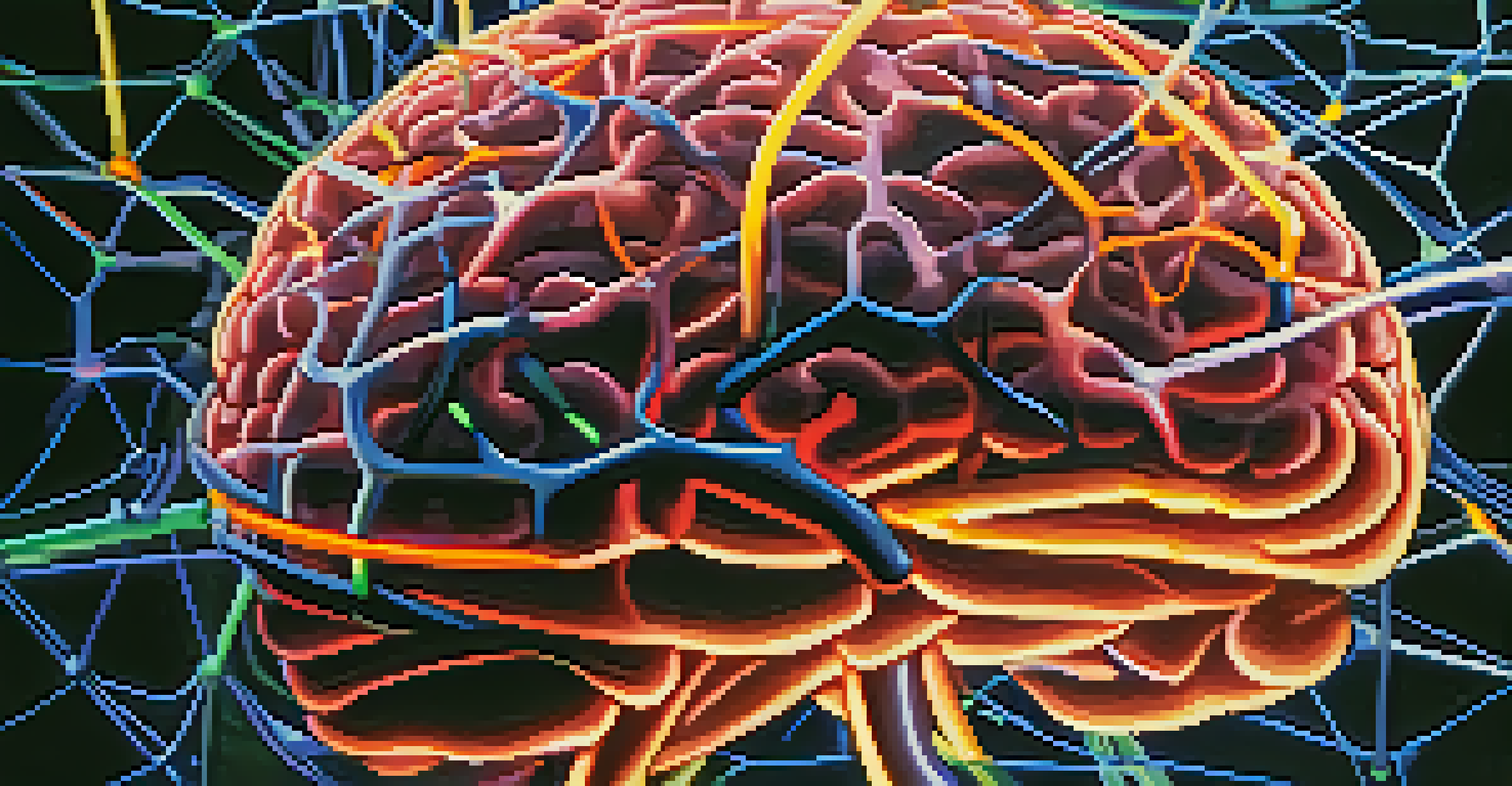The Therapeutic Potential of Hallucinogens on Existential Crisis

Understanding Existential Crises and Their Impact
An existential crisis often arises when individuals question their purpose and the meaning of life. This can be triggered by significant life events such as loss, trauma, or major transitions. During these moments, one might feel overwhelmed by uncertainty, which can lead to anxiety, depression, or a sense of isolation.
The unexamined life is not worth living.
Imagine standing at a crossroads, unsure of which direction to take; this is akin to what many experience during an existential crisis. The feelings of confusion and despair can be paralyzing, making it challenging to see a way forward. This state of mind can hinder personal growth and a sense of fulfillment in life.
However, understanding that this is a common human experience can be comforting. Many people grapple with these feelings at different points in their lives. Recognizing this can pave the way for seeking help and exploring various therapeutic options.
The Role of Hallucinogens in Mental Health Treatment
Hallucinogens, such as psilocybin and LSD, have garnered attention for their potential therapeutic benefits. Recent studies suggest that these substances may help address various mental health issues, including anxiety, depression, and PTSD. Their ability to alter perception and induce profound experiences can lead to significant shifts in thought patterns.

Think of hallucinogens as a reset button for the mind, allowing individuals to step outside their usual thought processes. This shift can lead to new insights about oneself and one’s place in the world, which is particularly beneficial during an existential crisis. Patients often report a renewed sense of clarity and connection after these experiences.
Existential Crises Are Common
Many individuals face existential crises, often triggered by significant life events, leading to feelings of confusion and isolation.
As research continues to unfold, the potential of hallucinogens as a mental health tool is becoming increasingly recognized. Institutions are conducting clinical trials, which aim to rigorously evaluate their efficacy and safety. This growing body of evidence may soon change the way we approach mental health treatment.
How Hallucinogens Can Help with Existential Questions
During an existential crisis, individuals often grapple with deep questions about life, death, and their own purpose. Hallucinogens can facilitate a unique introspective journey, allowing users to confront these profound questions in a safe environment. This exploration can lead to transformative realizations about one’s life and beliefs.
What lies behind us and what lies before us are tiny matters compared to what lies within us.
For instance, users have reported feeling a greater sense of interconnectedness with the universe, which can diminish feelings of isolation. This newfound perspective can inspire a sense of purpose and belonging that was previously lacking. It’s as if hallucinogens provide a different lens through which to view life’s complexities.
Moreover, the therapeutic setting in which these substances are used can enhance the experience. Guided sessions with trained professionals can help individuals navigate their thoughts and feelings, leading to a more meaningful and structured exploration of their existential concerns.
The Science Behind Hallucinogens and the Brain
Research shows that hallucinogens interact with serotonin receptors in the brain, particularly the 5-HT2A receptor. This interaction can lead to altered states of consciousness, which are often described as mystical or spiritual experiences. These experiences can foster a sense of connectedness and well-being, crucial for addressing existential concerns.
Visualize the brain as a complex network of highways. Hallucinogens essentially create new routes, allowing for fresh connections and perspectives. This 'rewiring' can help individuals break free from rigid thought patterns that contribute to their existential crises.
Hallucinogens May Offer Insight
Research suggests that hallucinogens can facilitate profound introspection, helping individuals confront existential questions and gain new perspectives.
Understanding the neuroscience behind hallucinogens adds a layer of credibility to their use in therapy. As we continue to learn more about the brain’s response to these substances, it becomes clearer how they can facilitate healing and personal growth in those facing deep existential questions.
Personal Experiences: Stories of Transformation
Many individuals have shared their transformative experiences with hallucinogens during existential crises. For example, one person described a session that allowed them to confront their fears about death, leading to a profound acceptance of mortality. This acceptance can be freeing, shifting focus from fear to appreciation of life.
These personal stories often highlight a common theme: a renewed perspective on life. Individuals frequently report feeling more connected to others and the world around them. This enhanced connection can diminish feelings of loneliness, which often accompany existential questions.
While each person's journey is unique, these narratives illustrate the potential for hallucinogens to catalyze significant personal growth. They serve as powerful reminders that healing can come from unexpected places, even within the depths of an existential crisis.
The Importance of Setting and Support in Therapy
The therapeutic potential of hallucinogens is highly influenced by the setting in which they are used. A safe, supportive environment can enhance the experience, allowing individuals to explore their emotions without fear or judgment. This is why guided sessions with trained professionals are recommended.
Consider the idea of a garden: just as plants need the right conditions to thrive, individuals need a nurturing environment to facilitate healing. This includes not only the physical setting but also emotional support from therapists who can guide the process. Having someone to help navigate the experience can make all the difference.
Therapeutic Setting Enhances Healing
The environment in which hallucinogens are used plays a crucial role in therapy, as a supportive setting can foster deeper emotional exploration.
Support systems, whether professional or personal, play a crucial role in integrating insights gained from hallucinogenic experiences. Without this support, individuals may struggle to make sense of their revelations, potentially undermining the benefits. Thus, a holistic approach is essential for maximizing the therapeutic effects.
Future Directions in Research and Therapy
As we move forward, the future of hallucinogens in therapeutic settings looks promising. Ongoing research is exploring various aspects, from optimal dosages to the long-term effects of these substances on mental health. This research aims to establish best practices for their safe and effective use in therapy.
Imagine a world where hallucinogens are widely accepted as valid therapeutic tools, similar to how we view antidepressants today. This shift could revolutionize the way we address mental health, particularly for those grappling with existential crises. It may open the door for new treatment modalities that prioritize holistic well-being.

However, it’s crucial to approach this frontier with caution. Continued dialogue about safety, ethics, and the importance of guided experiences will be fundamental as we navigate this evolving landscape. The goal is to ensure that the therapeutic potential of hallucinogens is harnessed responsibly and effectively.